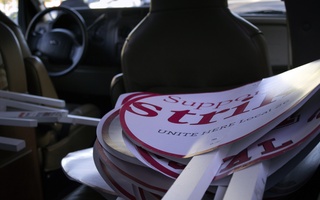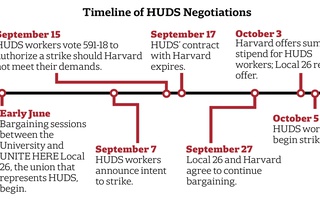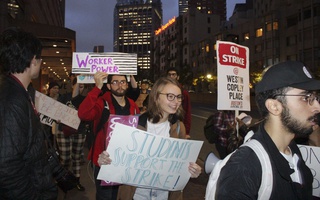The following remarks were delivered at Morning Prayers on Monday, October 24, before the news that Harvard and Local 26 had reached a tentative agreement:
For three weeks now, Harvard’s dining services workers have been engaged in a historic strike, the first of its kind since 1983. At stake in this battle are two very reasonable demands: livable annual wages and affordable health care. Given Harvard’s expansive endowment and celebrated capital campaign, the workers aren’t the greedy ones here.
As a longtime resident of Quincy House, I benefit immeasurably from the labor, talent, and friendship of my brothers and sisters in the dining hall. From the beginning of this strike, I have tried to do my part to ensure they get the fair contract they deserve, and to stand in solidarity with them until that happens.
When I was a graduate student at Columbia in the 1990s, the campus community had to figure out where we stood during multiple labor strikes. For my part, I taught off campus—in a church basement, an elementary school classroom, the backroom of a bar. Three weeks ago, I asked my students: Have you ever had to decide whether or not to cross a picket line? Most of them had no idea how to answer this question because they’ve never had to consider it. All that changed on October 5.
I learned not to cross a picket line long ago, not from some Ivy League professor, but from my parents and grandparents, all of whom had to strike at some point to demand their dignity as working people. The only reason I can now pay this lesson forward to my Ivy League students is because my folks walked the picket line. I have the privilege to teach because they had the courage to strike. That is why I moved my seminar from the Quincy dining hall when the strike started. I won’t teach about slavery and freedom in a classroom that requires me to cross a picket line to do so.
This is a difficult and defining time to teach at Harvard. Last Sunday, I learned about plans for a student walkout at 12:30 p.m. on Monday, in the middle of my American Protest Literature lecture. As a vocal supporter of the strike and workers, my position was clear, and I knew my longtime teaching colleague felt the same way, even though he expresses himself differently than I do, dating back to earlier campus battles over the Living Wage and Iraq War. We came up with a plan: We would talk about the history of labor strikes—after all, we were lecturing on Upton Sinclair and socialism last week—and then walk out with our students at 12:30.
Honestly, I had gone to bed uneasy, clear as I am about my position on the strike. My uneasiness—not unlike the uneasiness many faculty feel in this moment—stemmed from the fact that I have two values in tension right now: a responsibility to support the striking workers on the picket lines, and a responsibility to teach the students in my classrooms, many of whom support the strike, but some of whom don't or haven't yet decided where they stand.
I woke up thinking: It's easy for me to teach to the converted. But I also have an obligation—and a desire—to teach those whose views differ from my own. Isn't that the point of what we do? As I said to my students last Monday: This is a teachable and learnable moment for all of us, no matter where we line up right now.
So we revised our plan: I would start class by explaining our thinking and providing some context that helps students link what's going on in this strike with what we are studying in the course; I would then walk out with students who have decided to do so; and then my colleague would stay in class and continue to lecture about the history of labor protest as a way to set up our next lecture on Sinclair's "The Jungle." This is one advantage to team teaching: We can play different roles in a moment like this. Before I left class, I told them we want to give them an academic and a moral education, that these things are not mutually exclusive, and that our approach is meant to inform their decisions, not just now but in the future as well. I also assured them that there will be no expectation, judgment, or recrimination in our classroom. This was the kind of education I got at Harvard, when AIDS and apartheid were the issues of the day.
At 12:30, I walked out of class, only the second time I’ve done so in my teaching career; the other was the day before the Iraq War began. I'd be lying if I said I wasn't deeply moved when the vast majority of our students walked out, too. We joined the rally at the John Harvard statue, where I read the faculty petition in support of striking HUDS workers. We heard from students and workers who were fiercely eloquent in the way they expressed what's at stake for them in this strike. One of my favorite moments was when I realized the largest student contingents at the rally were from Protest Lit and Ec 10. You know it's a historic day at Harvard when students from such different classes stand in solidarity during a historic labor strike.
As exhilarating as all this can be, I still wonder and worry about the students who didn't walk out and never will, the students who don't and won’t agree with those of us who support the strike, and—perhaps most of all—the students who walked out because they felt coerced in some way into doing so. This is indeed a difficult and defining moment. There are no easy questions, or answers.
My prayer this morning is twofold: First, that our HUDS brothers and sisters can soon return from the picket lines to the dining halls with a fair contract; and second, that in the meantime we afford one another a fair hearing so that we can continue to teach and learn during these contentious times. Only then will we be able to resist the temptation to luxuriate in our own freedoms while others struggle to earn theirs. And only then will “Fair Harvard” be able to rightfully claim its commitment to Veritas.
Timothy Patrick McCarthy ’93 is Lecturer on History and Literature, Public Policy, and Education at Harvard University. A historian of politics and social movements, longtime resident of Quincy House, former vice president of the Harvard Alumni Association, and veteran of campus activism, he has co-taught “American Protest Literature” since 2002.
Read more in Opinion
The Mask in the Curtain: Against Yellowface at HarvardRecommended Articles
-
 Harvard Dining Services to Begin Strike Wednesday Morning
Harvard Dining Services to Begin Strike Wednesday Morning -
 Harvard—and Dining Workers Union—Prepare for Day One of Strike
Harvard—and Dining Workers Union—Prepare for Day One of Strike -
During Strike, Harvard Finds Alternate WorkersAbout 70 HUDS managers, 15 temporary hires, and 15 Harvard employees worked in the dining halls to serve meals throughout the day, a fifth of Harvard's usual labor supply.
-
 For Students, Strike Adds to Midterm Stress
For Students, Strike Adds to Midterm Stress -
 'Check Out of Marriott': Harvard Student Labor Advocacy Group Backs Local Hotel Strike
'Check Out of Marriott': Harvard Student Labor Advocacy Group Backs Local Hotel Strike













